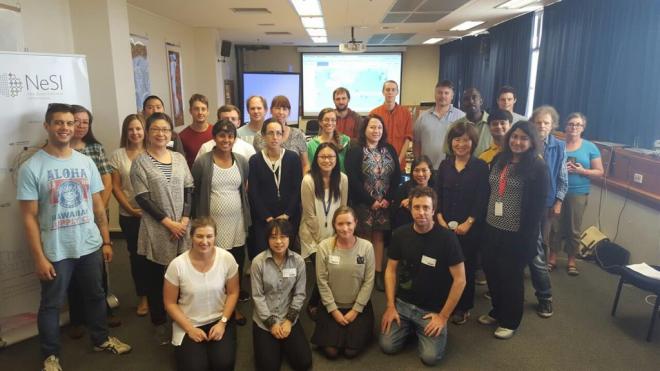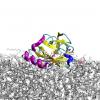Growing computational capacity among wet-lab scientists
Plant & Food Research training workshops
Computational lab skills are becoming essential for researchers across disciplines. Use of High Performance Computing infrastructure, such as the one provided by NeSI, requires such skills and one of the key challenges is that learning them is not typically a part of the curriculum. Plant & Food Research (PFR) has successfully leveraged the computational skills training programme supported across New Zealand by NeSI. The basis of this training is the Software Carpentry (SWC) workshop that teaches researchers how to automate their workflows using command line, adapt best practices in programming and use version control.
Organising and running a Software Carpentry workshop
In the first half of 2016, PFR hosted their first Software Carpentry workshop, hosted in Auckland and supported by NeSI. The workshop received a lot of positive feedback and provided a great experience for the PFR researchers involved in it.
Amali Thrimawithana, Sarah Pilkington and Lara Brian, researchers at PFR, co-ran the workshop, helping to set it up and then becoming a part of the instructor team. They reported that the experience of organising the event, teaching and being a helper was amazing. Though the workload of organising such an event is an immense task, at the end of the day achieving it all was well worth it. Organising this event at PFR meant teaming up with variety of groups with a range of expertise, including NeSI (specifically Georgina Rae and Sung Bae) and the PFR Information and Knowledge Systems department. A lot of help came from those involved as helpers and teachers. It really was a big team effort.
As Amali said: “We had to make sure we had backups especially in terms of IT/network issues, so thinking about those possible issues ahead of time and getting a few of the attendees to test the system and always having a plan B was important. For example, in one session of our workshop we got the attendees to use some test RNASeq data and knew there was a possibility someone may accidentally delete the raw data. That meant some of the trainees had to know how to access the backup data. We had to go to plan B for this one a few times on the actual day! Also having to deal with different operating system issues.”
“Being open to suggestions and feedback from attendees and other stakeholders is useful. It helped us think of things we hadn't considered. Arranging a regular follow-up and updates to let them know what was happening was well received too as we had a few people from other PFR sites, such as Ruakura and Te Puke, as well as ESR [Institute Of Environmental Science And Research] attending the workshop.”
Workshop impact and feedback
Amali also concluded that, “The feedback and impact has been extremely positive with a lot of people, including at management level, recognising the importance of such training (especially given that we are moving to a more and more digital age). A few people who were keen to attend the workshop missed out due to other commitments, so they have shown keenness for another event, with a few suggesting running workshops at other PFR sites. Also, with people who attended the workshop sharing their experience around campus, we now have more people wanting to attend such workshops and to take on the training with more uptake of the Powerplant system, an in-house cluster system. Now the bottleneck is getting them through the training.”
Outreach and promoting training
Both before and after the workshop, Sarah Pilkington and Lara Brian gave a series of talks to promote this type of training among their peer research community. Their goal was to get researchers to come along to the SWC workshop in Auckland and then keep the momentum going at other PFR sites around the country. Here are more details about their experiences:
* How did you come up with the idea of the talk?
“After conquering our mountain of data via learning how to code, we realised that we enjoyed the learning experience and that coding could be really beneficial to other scientists. But first we had to overcome their prejudice and fear of coding. We thought as scientists we might be able to better explain these concepts and relate the benefits to our peers.”
“Learning how to code was a very steep learning curve for us, so we wanted to relate that back to another event in life that was difficult and scary to begin with, but is something we now do every day and is well worth the effort. We came up with the ‘walking vs. learning how to drive’ analogy – driving was a very scary thing to learn, but now we do it every day and it provides the opportunity to explore and do things we couldn’t do by just walking, which is a lot like coding. We wanted to break down barriers and make it easy for people to digest and understand.”
* How did that connect back to the Software Carpentry workshop?
“We wanted to help Amali advertise her event seeing as she did an amazing job teaching us! We provided an introduction to the tools taught in SWC as some people had never heard of the advertised tools before and how or why you would use them. Our main audience was wet-lab plant scientists (biochemists, molecular biologists, physiologists, entomologists) with zero coding experience and a fear of the black screen of doom.”
* What are the key points you're raising in your talk and why?
· As fellow scientists with no coding background we could relate to their fears of learning something so foreign and make it seem a bit more user friendly.
· Coding is something we shouldn’t be afraid of and it is something we should embrace as scientists moving into the future of big data.
· Learning how to code is a worthwhile investment of your effort and time and will help you with your science and be a better scientist.
* How was your talk received?
Our talk was well received by both scientists and bioinformaticians – more so than we expected. Our talk was simple and it gave people the confidence to explore coding for the first time. We had a huge turnout and in turn had an oversubscription to Amali’s subsequent Software Carpentry sessions. As a result, our General Manager and Chief Scientist sent us around the country to spread our message.
The talk that Sarah and Lara were presenting across PFR sites can be seen on the video below:
Further work
As a follow up, PFR Auckland has introduced drop-in sessions onsite for those wanting to continue work and had people dropping in to get assistance, self-motivated by their new coding skills. For the teachers and helpers involved in the workshop it was clearly a great experience which contributed to their professional development. This experience has sparked the momentum for increasing digital literacy at PFR.







